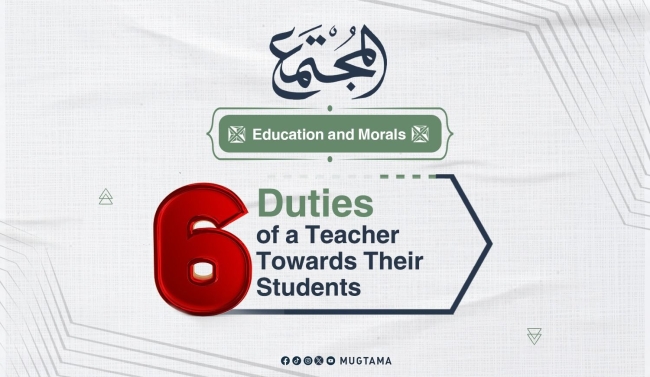The Islamic civilization distinguished itself by emphasizing the discipline and education of children. Many parents even hired tutors and educators for their children. Ibn Qutaybah mentioned in ‘Uyoon al-Akhbar that Utbah ibn Abi Sufyan said to his son's tutor: "O Abd al-Samad, let your correction of my son be like your correction of yourself, for their faults are tied to yours. What they consider good is what you deem good, and what they consider bad is what you deem bad. Teach them the ways of the wise and the manners of the cultured. Warn them through me and discipline them without me, and be to them like a doctor who does not hasten with medicine until he knows the illness. Do not rely on an excuse from me, for I have entrusted their upbringing to your competence." (1)
The following outlines what a teacher must do towards their students:
First: The pursuit of teaching for the sake of Allah
The dedication to teaching sincerely for Allah's sake is more likely to bring reward and compensation. Ibn al-Sam'ani mentioned that Shaykh Abu Mansur al-Khattab was seen in a dream after his death and was asked, "What did Allah do with you?" He replied, "He forgave me because of teaching children the Opening of the Book (Al-Fatiha)." (2)
Second: Kindness and mercy towards students
Allah says: "So by mercy from Allah, [O Muhammad], you were lenient with them. And if you had been rude [in speech] and harsh in heart, they would have disbanded from about you." (Al-Imran: 159). In Sahih Muslim, Mu'awiyah ibn al-Hakam al-Sulami narrated: While I was in Salat with Messenger of Allah (ﷺ), a man in the congregation sneezed and I responded with: 'Yarhamuk-Allah (Allah have mercy on you).' The people stared at me with disapproving looks. So I said: "May my mother lose me. Why are you staring at me?" Thereupon, they began to strike their thighs with their hands. When I saw them urging to me to remain silent, I became angry but restrained myself. When Messenger of Allah (ﷺ) concluded his Salat. I have never before seen an instructor who gave better instruction than he, may my father and mother be sacrificed for him. He neither remonstrated me, nor beat me, nor abused me. He simply said,"It is not permissible to talk during Salat because it consists of glorifying Allah, declaring His Greatness as well as recitation of the Qur'an,"
Third: Setting an example
The student imitates the teacher’s actions before their words, and often copies them without realizing it. Utbah ibn Abi Sufyan used to say to his son’s tutor: "Let your correction of my son be like your correction of yourself, for their faults are tied to yours. What they consider good is what you deem good, and what they consider bad is what you deem bad." (3)
Fourth: Creating curiosity and stimulating interest
A teacher must excite their students’ interest without overwhelming them to the point of boredom. In Sahih al-Bukhari and Muslim, Abdullah ibn Mas'ud narrated: "The Prophet (ﷺ) used to take care of us in preaching by selecting a suitable time, so that we might not get bored."
Part of stimulating interest is introducing the student to areas of knowledge that they need and will benefit from in this world and the Hereafter. The Sunnah provides many examples of this. In Sahih Muslim, Abu Hurairah narrated that the Messenger of Allah (peace and blessings be upon him) said: "Shall I not tell you something by which Allah effaces the sins and elevates ranks (in Jannah)?" The Companions said; "Certainly, O Messenger of Allah." He (ﷺ) said, "Performing the Wudu' thoroughly in spite of difficult circumstances, walking with more paces to the mosque, and waiting for the next As- Salat (the prayer) after observing Salat; and that is Ar-Ribat, and that is Ar-Ribat."
Similarly, in Sunan al-Tirmidhi, Abu Darda' narrated that the Messenger of Allah (peace and blessings be upon him) said: “Would you like me to tell you the best and purest of your deeds in the estimation of your King, those which raise your degrees highest, those which are better for you than spending gold and silver, and are better for you than that you should meet your enemy and cut off one another's head?” On receiving a reply in the affirmative he said, “It is remembering God.” There are many other such methods to arouse curiosity and interest.
Fifth: Variety in teaching methods
A teacher should not always stick to one way of presenting topics. They should vary their methods. Sometimes teaching through lectures, other times through debates, discussions, questions and answers, or stories and examples, so students do not get bored and instead enjoy the different teaching styles.
Sixth: Expanding answers to students' questions when beneficial
If a student asks a question, the teacher should answer it and expand the answer if they see the student would benefit from the additional information.
Abu Hurairah narrated that a man told God’s messenger that he sailed on the sea taking a small quantity of water with him. As he would suffer from thirst if he used this for ablution, he asked whether he might use sea water for that purpose, and received the reply, “Its water is pure, and what dies a natural death in it is lawful food.” The man had asked about ablution with seawater, but the Prophet added to the answer by mentioning something that would benefit the man as a frequent sea traveler.
-------------------------------------------------------------
(1) ‘Uyūn al-Akhbār by Ibn Qutaybah (2/182)
(2) Shadharāt al-Dhahab fī Akhbār man Dhahab by Ibn al-‘Imād al-Ḥanbalī (5/418)
(3) ‘Uyūn al-Akhbār (2/182)


